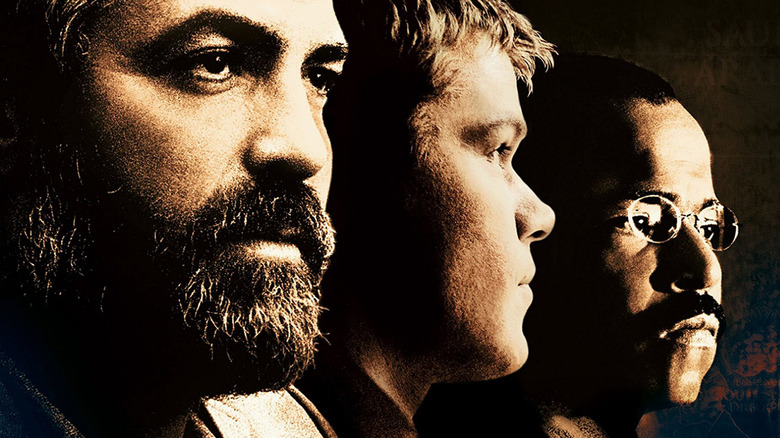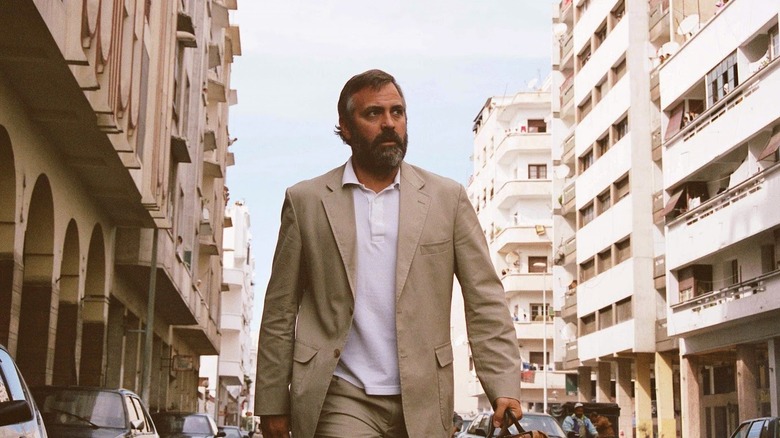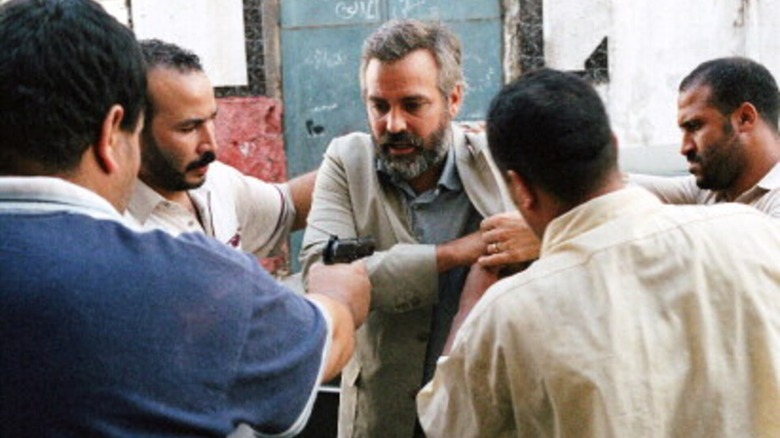George Clooney Put Himself Through The Wringer To Prepare For Syriana
Stephen Gaghan's 2005 film "Syriana" is a gritty and intense espionage thriller based on the 2003 book "See No Evil," and it came at a time in cinema history — specifically, in the eight years following 9/11– when such thrillers became more interested in the on-the-ground violence and byzantine bureaucracy of lies that goes into starting wars in the Middle East. Gaghan's screenplay for "Syriana" — like his previous hit "Traffic" — is massively complicated, taking place in a dozen countries, and involving multiple storylines, some of which only connect in circuitous ways. It may be a difficult film to follow, but it did accurately capture how off-balance the world felt in the mid-2000s, while also openly criticizing certain governments for deliberately getting involved in quagmires with no exit strategies.
In "Syriana," George Clooney plays a CIA field agent named Barnes who is initially tasked with stopping arms deals in the Middle East. And when that fails, he's tasked with a desk job. And when that fails, he's assigned to assassinate a Emirates foreign minister (Alexander Siddig). That one particular story only gets more complicated, as do the five other storylines in the film.
Clooney was just coming off "Good Night and Good Luck," his sophomore film and one that scored him Oscar nominations for Best Director and Best Screenplay. "Syriana" was a "serious" prestige picture, and Clooney, ever the professional, devoted himself to the role with predictable aplomb and capability. This required a great deal of stress on his body, however, and Clooney — in addition to a great deal of not-at-all-fun weight gain — ended up suffering from some unfortunate health maladies on set.
In a 2005 interview with MIT's The Tech, Clooney described some of the more torturous elements of working on Gaghan's film.
30 pounds in a month
As pointed out by The Tech, Clooney had to gain 30 pounds in a month to play Barnes. For that month, overeating was his profession:
"The truth is it's not nearly as fun as it sounds, the idea of putting on that kind of weight, but at the end of the day, in general, that's what we do for a living. So my job was just to eat as fast as I could, as much as I could ... But mostly you just ate until you wanted to throw up, and made sure you didn't throw up. So that was my job for a month, was eating."
Barnes also had to speak several lines in Arabic and in Farsi for "Syriana," and Clooney was only partially equal to the task:
"I had an Iranian roommate in college, so Farsi wasn't so hard, but Arabic almost killed me. There's no Latin to it, so there's nothing I could really cling to. So it was really hard. I had to learn it phonetically and it was a tricky thing, but you spend a few weeks just practicing and you start learning."
Another factor for Clooney to consider was that most ineffable of things: his popular image. Prior to "Syriana," the bulk of Clooney's roles tapped into his strengths as a charmer or a flirt. "Syriana" was one of Clooney's first major role wherein he played a put-upon character defined less by their sparkle and more by their weariness. Luckily for Clooney, it didn't challenge him as much as a viewer might think:
"Well, it wasn't so hard. I'm fairly familiar with the guy. I spent a lot of time with Bob Baer, the real CIA guy. So the transition was mostly about making sure that there weren't any elements of Danny Ocean in this character. The way you do that, first of all, you do it changing physically, and then you spend a lot of time with the real guy to understand why he's so disenchanted with his role at the CIA and how he feels deserted, and then you sort of toss that into the mix. So it's a little bit of everything, a lot of information and a little bit of shaving your hair back."
Clooney's injuries
Clooney's preparations were difficult, but filming presented challenges as well. It was a physically grueling role that required a lot of physicality and torment. At one point during filming, Clooney found spinal fluid leaking out of his nose (!). It turns out "Syriana's" torture scenes were a little rougher than expected:
"It was my own dumb fault. I was taped to a chair and a guy was pretending to hit me. It's all fake, you're not really getting punched, and I flipped myself over on the chair, and cracked my head and tore what's called my dura, which is the wrapping around your spine, and ended up with what they call CSF leak, which is a cranial spinal fluid leak. Good fun. I highly recommend it for everybody out there."
I think we can read Clooney's recommendation as perhaps being sarcastic. Of course, Clooney continued, those were the toughest scenes to film:
"[T]he hardest obviously was me getting tortured. The problem was that I got injured along the way. I thought I had an aneurysm. It was a long, drawn out ... it was a couple of days of sitting in a room taped to a chair and getting buckets of water, which isn't in the film anymore. There's a lot more torture to it that you don't see ... Sort of like what we're doing in the administration! Just kidding! But anyway, I think that was by far the toughest scene to shoot, but it should have been; it was designed to be that way."
The Tech asked Clooney point blank what the political message was. He was diplomatic:
"I think it's sort of important, although I've certainly been outspoken at times politically, I thought it was important between "Good Night, and Good Luck" and "Syriana," both films, that the idea was not to be political, necessarily. Obviously it's a political film, but we showed this to a lot of neocons who liked it and agreed with it. Our argument, of course, is to raise a debate, not to tell people what the answers are, because clearly we don't have any answers for this, the issues or the problems."
"Syriana" is currently available to stream on Hoopla.


